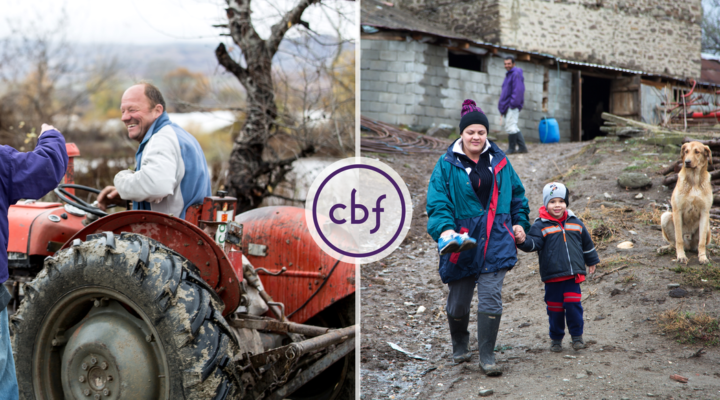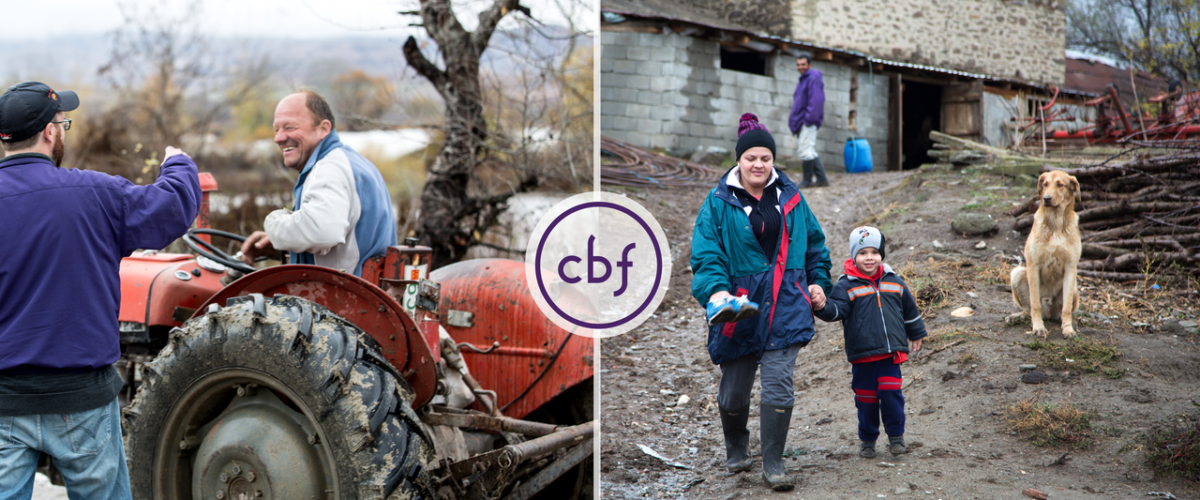CBF field personnel help Macedonians ‘realize the change in themselves’ through cow farming
By Greg Warner
A cow is a cow is a cow…unless it’s more than a cow. At Aya Farm in rural Macedonia, a cow is never just a cow. Sometimes a cow is a life-changing opportunity. Or a way out of poverty. Sometimes it’s a community’s future. Or a celebration of God’s creation and our role in sustaining it.
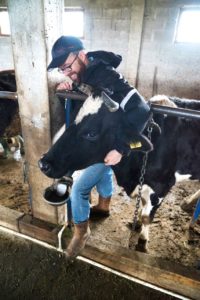
CBF field personnel Jeff Lee provides care for the cows at Aya Farm, where he and his wife, Alicia, facilitate a “cow banking” ministry.
Aya Farm is a “cow bank” started in part by Cooperative Baptist Fellowship field personnel Alicia and Jeff Lee, now in their seventh year in Skopje, the capital of Macedonia, a small country on the Balkan Peninsula in south-central Europe.
“A cow bank provides a ‘loan’ of a cow to a local farmer to help them with their herd, their family and their neighbors,” explained Jeff, a native of Arlington, Texas. “We give them small cows that will take about a year to grow up before they’re ready to milk.”
With the first calf born to that cow, the farmer “repays” the loan. The new calf is given to another farmer, allowing the ministry of Aya Farm to grow and more families to prosper.
“In Macedonia, 80 percent of the milk production is done by farmers with five cows or less,” Jeff said. “This program is geared to those farmers to help them. Instead of one cow, they’ll have two cows now. That doubles their milk production.”
Macedonian life, historically and now, is tied to the land. Almost half the population is rural, and farming is the third largest sector of the economy. About 30 percent of households are family farms.
Life is simple but hard in this former republic of Communist Yugoslavia. Unemployment is high (27 percent) and per capita income modest (US $14,500).
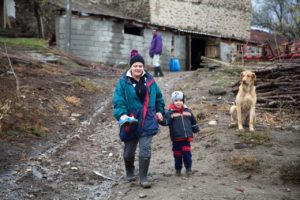
The cow banking ministry assists bivocational and itinerant pastors like David, whose wife and son are pictured here on the farm in Gradsko, Macedonia.
Though ancient in its origins, the Republic of Macedonia is a relatively new nation, emerging in 1991 from the breakup of Communist Yugoslavia. Now a candidate for membership in the European Union, it is bordered by Bulgaria to the east, Greece to the south, Albania to the west and, to the north, two countries that were also part of the former Yugoslavia—Kosovo and Serbia.
Though poverty is widespread, it is even worse among ethnic Albanians, who have been a target of persecution by ethnic Macedonians for decades. Aya Farm is in Zherovanje, a predominantly Albanian community 55 kilometers west of Skopje in northwestern Macedonia, which borders the country of Albania and has the highest concentration of ethnic Albanians—about 25 percent.
“Albanians tend to be on the margins,” Alicia said. “There has been discrimination against Albanians, where they haven’t had as many opportunities for education, for success, or even for their language and culture to be recognized in the country,” Alicia added.
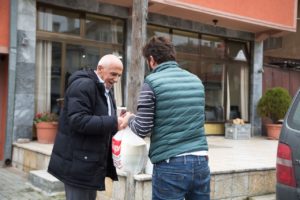
Gazmend Muharemi (right) delivers dairy orders to customers in the village surrounding Aya Farm.
To make a better future for them, a cow bank just makes sense, according to Alicia and Jeff. With one cow, a family can climb out of poverty and even help its neighbors. The cow bank is one of several strategic partnerships the Lees have cultivated in their seven years in Skopje. Each is intended to achieve transformational development, which is the basis for almost all CBF work overseas. Transformational development focuses energy and resources in strategic, holistic ways to improve the physical, emotional and spiritual health of a people.
“CBF’s impact in Macedonia has always been around transformational development, whether it be in education and farming and the lives of children or other marginalized people groups,” said Alicia, a native of Garland, Texas, who met Jeff while both were students at Hardin-Simmons University in Abilene, Texas. “So it’s been incredible to be part of renewing God’s world through something like farming.”
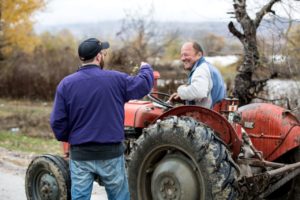
CBF field personnel Jeff Lee (left) consults with a local farmer.
Like Aya Farm, each of the Lees’ partnerships involves local residents using local assets to meet local needs. In addition to the cow bank, the Lees are helping Natalia Gura build a foster home for needy children; assisting Dusko Hristov expand his food bank—the first in Macedonia—from his small apartment to a large warehouse; helping the Poraka Day-Care Center in Volcovo educate and provide daily care for 50 special needs adults; assisting a group of bivocational itinerant pastors feed their families and congregations; and partnering with a Jesuit organization to assist international refugees.
“When we do transformational development, we are working with local partners to seek change in the lives of the people and of the community that they’re a part of,” Jeff said. “I’m not bringing about that change. I’m helping them realize the change in themselves. That’s what transformational development is. When we come here, we don’t bring our ways of doing it. We find the people that are passionate for that change in their community, and we encourage them, connecting them with other people.”
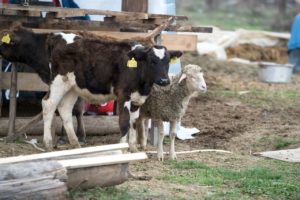
Aya Farm is not only home to the “cow bank,” but is a working farm with other livestock as well.
All those partnerships contribute to an even larger strategic goal—to foster the image of God in people, communities and even creation. “When I see the people of Macedonia, I see God—I see the image of God in them,” Jeff said. “We celebrate God’s imprint on us as humans in that we are created in the image of God. When we recognize the image of God in people, and when they recognize it themselves, that’s when change occurs.”
God has also come to break the bonds of oppression for all of creation, said Jeff, who holds a degree in environmental science from Hardin-Simmons and later worked for the city of Abilene doing pollution remediation.
“We try our hardest to use organic practices,” said Jeff. “We try to minimize our impact on the environment around us. We try to be a benefit by planting trees, by picking up trash, by cleaning the water.”
Jeff says the farm’s two goals—“to produce and protect”—are not in conflict. In fact, Aya Farm is believed to be the first solar farm in Macedonia, which benefits the environment and the budget.
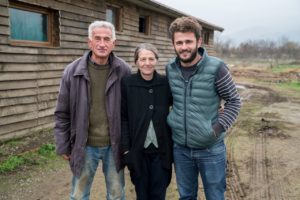
Gazmend Muharemi pauses for a photo with his mother and father.
“We are very excited about that,” said Gazmend Muharemi, a young Macedonian man who owns the farm and is the Lees’ partner in the cow bank. “Here in Macedonia, electric power is very expensive, and that’s why we decided to invest in solar panels,” he said. “Now I can say to all the farmers that they should start doing it.”
Jeff and Muharemi came up with the idea of a cow bank while brainstorming three years ago. “Gazmend is a person of big heart,” Lee said about his friend, a 35-year-old Albanian Muslim. “He cares about Macedonia. He cares about the land. He has a heart for the people around him.”
The most obvious problem with their plan: They had no cows!
In the spring of 2015, Lee called several CBF churches and said: “‘I want to buy a cow for a farmer. Will you help me?’ Immediately people were saying, ‘I can buy a cow. How much is a cow?’” The $1,000 price tag was little deterrence. “The money just came in from CBF churches across the country. They said, ‘I want to be a part of that.’”
First Baptist Church of Abilene, Texas, the Lees’ home church, gave the first two cows—one they appropriately named “Abby.” The Baugh Family Foundation in San Antonio bought the farm a tractor.
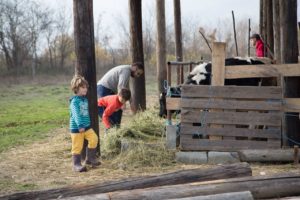
Diar Muharemi (left) and Ethan Lee help the adults with the work on the farm.
“We are very, very thankful for them,” Muharemi said of the CBF supporters. “Many of them have visited us, and we appreciate all of the ways that they helped our farm.”
That Aya Farm even exists, Muharemi said, justifies its name since “aya” means “miracle.”
“It’s a miracle because before we started farming, we never knew about farming,” he said. Previously a marketing manager and purchasing manager for companies in Macedonia and Afghanistan, he quit to spend less time traveling and more time with his family. He and his wife, Aylin, have a five-year-old son named Diar.
“Now we have a successful corporation,” Muharemi marveled. “Our number of cows is going up and up. We increase the number of the cows and we are prospering day by day.”
Aya Farm now has 45 cows, all German Holsteins, and two employees. In the first three years, the farm distributed 15 cows and two bulls to local farmers. Six went to a group of itinerant, bivocational pastors struggling to support their low-income families and congregations.
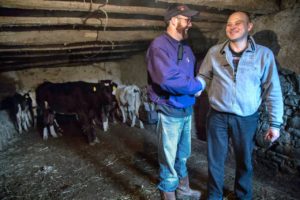
Jeff Lee (left) speaks with a local farmer involved with the cow bank.
The pastors share the work and the produce—milk, cheese, butter—for their families and their congregations. None of them have farmed before, Jeff said, so there is much to learn—what to feed the cows, when to call a vet. They’re willing and they’re able. They are so passionate about it. They call me and say, “Jeff, what about this? Can I feed my cow this?”
With their other cows, the pair sells dairy products to about 75 families in Skopje and surrounding villages—and they deliver five days a week! “We have more and more orders, day by day,” Muharemi said. The farm also grows tomatoes, potatoes, peppers, watermelons and other produce for Muharemi’s family, neighbors, a food bank and “to the people who need.”
For Muharemi, those 45 cows represent something more than milk and cheese—nothing less than the revitalization of Macedonia. The Macedonian population and economy have been shrinking for more than a decade, partly because young people are leaving for better jobs elsewhere in Europe. The rural areas are hit the hardest. Muharemi says things like farms and cow banks hold promise for Macedonians, who are hard-working, friendly and hospitable. “I think they will have a future and no need to leave the country and go to investing in Europe countries,” he said.
“Gazmend sees that as the future of Macedonia,” Jeff said. “He wants to be a part of that throughout Macedonia.”
The Lees are convinced that working in partnership to do asset-based development is the best approach. “We don’t need to be owners of anything in Macedonia,” Jeff said. “In Macedonia, there are people that are capable and have a passion for their own community. They have ability. They have the assets already here. Maybe they just need a little encouragement. Maybe they need some connecting with other people.”
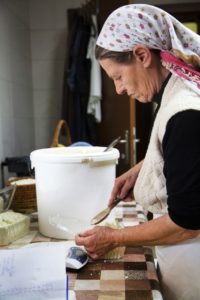
Gazmend’s mother packages homemade cheese that is produced at Aya Farm.
“Without CBF churches, individuals and groups coming alongside us, praying for us, encouraging us, financially supporting us, there’s no way that we can do this,” Jeff said. “CBF churches have, of course, supported us financially; but, more than just that, they’ve sent prayers, they’ve sent people, they’ve sent ideas. We like to tell churches that they’re doing the work with us, that they’re just as important as we are. We are physically living in Macedonia, but we can’t do this work without them. We immediately decided, ‘Let’s see if we can work together,’” Jeff recalled.
On the other hand, Alicia and Jeff consider themselves dispensable. As evidence, he cites the lasting relationships being established between the Lees’ Macedonia ministry partners and CBF churches that visit. “Every time they leave, they’ve made a connection with our local partners in work that can basically be done without us,” Jeff explained. “They don’t need to say, ‘Hey Jeff, we have an idea for the farm. Can you ask Gazmend?’ No, they go straight to Gazmend. A group of people from around the world coming together to do something wonderful, to do something that we can’t do by ourselves—that is partnership.”
Join God’s mission in the world. Give to the Offering for Global Missions. 100 percent of your church’s gifts will be used to send CBF field personnel to share the Good News of Jesus Christ around the world. Go to www.cbf.net/transform and order your free OGM resources today.
This article appeared in the Winter 2018-19 issue of fellowship! magazine, the quarterly publication of the Cooperative Baptist Fellowship. Read online here and subscribe for free to fellowship! and CBF’s weekly e-newsletter fellowship! weekly at www.cbf.net/subscribe.

